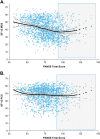Impaired insight in schizophrenia: impact on patient-reported and physician-reported outcome measures in a randomized controlled trial
- PMID: 36031632
- PMCID: PMC9420291
- DOI: 10.1186/s12888-022-04190-w
Impaired insight in schizophrenia: impact on patient-reported and physician-reported outcome measures in a randomized controlled trial
Abstract
Background: Impaired insight poses a challenge in the treatment of patients with schizophrenia because of its potential to jeopardize therapeutic engagement and medication adherence. This study explored how insight impairment, graded from none to extreme, is related to patient-reported mental health status, depression, and neurocognition in schizophrenia.
Methods: In a post hoc analysis of the Clinical Antipsychotic Trials of Intervention Effectiveness (CATIE) study (NCT00014001), insight was measured using the Positive and Negative Syndrome Scale (PANSS) Item G12 (lack of insight). Additional assessments for this analysis included the 12-Item Short-Form Health Survey (SF-12) Mental Component Summary (MCS), physician- and patient-reported Clinical Global Impression-Severity (CGI-S), MATRICS Consensus Cognitive Battery, and Calgary Depression Scale for Schizophrenia. Relationships between patient-reported outcomes and PANSS total and Item G12 ratings were evaluated.
Results: Among 1431 CATIE study participants in this analysis, increasingly impaired insight at baseline was significantly associated with better patient-reported quality of life (QoL), lower baseline depression, and greater divergence between physician- and patient-reported illness severity. Patients with more severely impaired insight reported milder illness compared with physician reports, particularly those with moderate-severe to extreme impairment (PANSS Item G12 rating ≥ 5), approximately 10% (138/1431) of CATIE participants. For the 90% of patients with PANSS Item G12 ratings < 5, patient-reported QoL decreased with increasing symptoms. SF-12 MCS scores were linearly related to baseline PANSS total score only in patients with PANSS total score < 90 (moderately ill or better), and better symptom scores were associated with higher QoL. No significant relationship between insight and neurocognition was observed.
Conclusions: In the small subgroup (10%) of CATIE study patients with schizophrenia and PANSS Item G12 ratings ≥5, moderate-severe-severe/extreme insight impairment was associated with significantly more positive perception of QoL and illness severity by the patient versus the treating physician. This was not observed in the remaining 90% of patients with normal to moderately impaired insight, suggesting that poor insight as a threat to the validity of self-report is uncommon.
Keywords: CATIE schizophrenia trial; Insight; Neurocognition; PANSS; Patient-reported outcome; Quality of life; SF-12; Schizophrenia.
© 2022. The Author(s).
Conflict of interest statement
Dr. Lysaker has no competing interests. Dr. McEvoy has received consulting fees from Alkermes, Inc., in the past. Dr. O’Sullivan is an employee of Alkermes, Inc., and may own stock in the company. At the time of the study, Drs. Sun and Weiden were employees of Alkermes, Inc., and may own stock in the company.
Figures



References
Publication types
MeSH terms
Substances
Grants and funding
LinkOut - more resources
Full Text Sources
Medical

